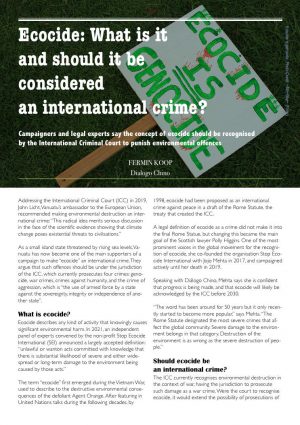 Campaigners and legal experts say the concept of ecocide should be recognised by the International Criminal Court to punish environmental offences
Campaigners and legal experts say the concept of ecocide should be recognised by the International Criminal Court to punish environmental offences
Addressing the International Criminal Court (ICC) in 2019, John Licht, Vanuatu’s ambassador to the European Union, recommended making environmental destruction an international crime: “This radical idea merits serious discussion in the face of the scientific evidence showing that climate change poses existential threats to civilisations.”
As a small island state threatened by rising sea levels, Vanuatu has now become one of the main supporters of a campaign to make “ecocide” an international crime. They argue that such offences should be under the jurisdiction of the ICC, which currently prosecutes four crimes: genocide, war crimes, crimes against humanity, and the crime of aggression, which is “the use of armed force by a state against the sovereignty, integrity or independence of another state”.
What is ecocide?
Ecocide describes any kind of activity that knowingly causes significant environmental harm. In 2021, an independent panel of experts convened by the non-profit Stop Ecocide International (SEI) announced a largely accepted definition: “unlawful or wanton acts committed with knowledge that there is substantial likelihood of severe and either widespread or long-term damage to the environment being caused by those acts.”
The term “ecocide” first emerged during the Vietnam War, used to describe to the destructive environmental consequences of the defoliant Agent Orange. After featuring in United Nations talks during the following decades, by 1998, ecocide had been proposed as an international crime against peace in a draft of the Rome Statute, the treaty that created the ICC.
A legal definition of ecocide as a crime did not make it into the final Rome Statue, but changing this became the main goal of the Scottish lawyer Polly Higgins. One of the most prominent voices in the global movement for the recognition of ecocide, she co-founded the organisation Stop Ecocide International with Jojo Mehta in 2017, and campaigned actively until her death in 2019.
Speaking with Diálogo Chino, Mehta says she is confident that progress is being made, and that ecocide will likely be acknowledged by the ICC before 2030.
“The word has been around for 50 years but it only recently started to become more popular,” says Mehta. “The Rome Statute designated the most severe crimes that affect the global community. Severe damage to the environment belongs in that category. Destruction of the environment is as wrong as the severe destruction of people.”
Should ecocide be an international crime?
The ICC currently recognises environmental destruction in the context of war, having the jurisdiction to prosecute such damage as a war crime. Were the court to recognise ecocide, it would extend the possibility of prosecutions of individuals for harms such as deforestation; the court only holds individuals accountable, which means those at the top of industries and governments would face ecocide charges, rather than organisations or states.
Criminalising ecocide would also address a legal gap related to the environment, campaigners argue. Legal accountability typically hinges on damage to individuals, or private or public property. This framework proves challenging when polluters are contributing to the more extensive destruction that causes global-level harm.
“We have environmental agreements but they are not binding; there’s nothing with real teeth. Ecocide provides this” – Jojo Mehta, co-founder of Stop Ecocide International
In 2018, the UN report “Gaps in International Environmental Law” found the existing environmental law regime to be fragmented, unclear and reactive. “It is characterised by fragmentation and a general lack of coherence and synergy among a large body of sectoral regulatory frameworks,” the report reads, claiming this leads to a deficit in coordination at the law-making and implementation levels.
Kate Mackintosh, a researcher at the University of California and a co-creator of SEl’s ecocide definition, tells Diálogo Chino that its criminalisation would hit corporate actors the hardest. “Imaging sitting in the board room to discuss a fossil fuel project and the legal team says there’s a risk of ecocide – it has a high deterrent value,” she says.
Has the ecocide concept gained momentum?
In 2022, Pope Francis wrote a letter to the Argentinean Association of Professors of Criminal Law that referenced ecocide and called upon the legal system to “create a normative system that includes insurmountable limits and ensures the protection of ecosystems.” Swedish climate activist Greta Thunberg has also supported the campaign, donating 100,000 euros (US$109,000) to the Stop Ecocide Foundation in 2020.
In 2021, France’s National Assembly passed an environmental bill that made ecocide a civil offence. In the same year, Belgium’s Federal Parliament adopted a resolution to recognise the crime of ecocide at a national and international level. Last November, the European Union agreed to update its environmental crime directive, punishing cases of ecosystem destruction with tougher penalties.
In Latin America, Chile approved a law in August 2023 that added a new chapter to its Penal Code related to crimes against the environment; it incorporates several elements of the ecocide definition. Earlier in June, in Brazil, the left-wing political party PSOL presented an ecocide bill to Congress, while in Mexico a similar bill was submitted in August.
“There’s a strong basis for support for ecocide; there are active discussions in parliaments around the world,” Anna Maddrick, a legal analyst for SEI, tells Diálogo Chino. “The general feeling in the court is that if there’s enough support from the states the court will be in favour. Ecocide is the missing element in the Rome Statute.”
The ICC has also placed emphasis on prosecuting environmental crimes within the limitations of its existing jurisdiction. A 2016 policy paper on case selection highlighted the court’s inclination to prosecute crimes involving illegal natural resource exploitation, land-grabbing and environmental damage. This triggered several complaints against Brazil’s ex-president Jair Bolsonaro to be filed with the ICC, citing his destruction of environmental policies and violations of Indigenous rights. So far, these cases have not been taken up the court.
“If ecocide had been recognised already, some of what happened in places like Brazil would have gone a different way,” says Mehta.
What needs to happen next?
The movement to criminalise ecocide has clearly gained momentum in recent years, yet several challenges must be overcome to achieve its inclusion in the ICC’s statute.
Initially, a country must propose an amendment to the Rome Statute. For this proposal to proceed to negotiations, it must be approved by a majority of the 124 states parties to the statute. Then, the proposal undergoes multiple negotiation rounds before returning to these members for another vote. To pass, an amendment needs support from at least two-thirds of members.
Were such an amendment to successfully pass these stages, individual member states would still retain the right not to ratify it. This outcome would impose limitations on the ICC’s jurisdiction over that member’s territories and citizens. Additionally, states that are not party to the Rome Statute would be unaffected, further limiting the reach of such ecocide legislation.
While Vanuatu has raised the issue on the political agenda, the country has yet to officially propose the modification of the Rome Statute. Whether any government will take such a bold step remains to be seen, but Mehta argues that the likelihood is increasing: “The more the conversation grows, the faster it expands at a political level.”
Fermin Koop
Originally published
by Dialogo Chino
Jenuary 16, 2024

